Guesswork in keyword research is costing you real-time organic traffic and high-value conversions.
SERP keyword research tools remove the guesswork by showing live search results and relevant SEO metrics, which will help you choose search queries that drive real clicks.
We tested several SERP keyword research tools and compiled the ones that are best for this SEO need.
Let’s check them out!
Table of Contents
Key Features of the Best SERP Keyword Research Tools
The best SERP keyword research tools help you see what searchers see, uncover content gaps, ranking patterns, real-time opportunities, and more.
Here are the essential features that reveal these metrics:
Comprehensive & Accurate SERP Metrics
One of the biggest mistakes in keyword research is ignoring what the search results look like. This often leads to poor keyword choices and wasted effort.
Keyword research tools that provide comprehensive and accurate SERP metrics solve this problem. These offer metrics that show you exactly:
- Who is ranking?
- How strong those pages are, and
- What content types dominate the SERPs?
You also get precise data on domain strength, content length, backlink profiles, and ranking volatility.
As an added data point, these tools show each keyword:
- Search volume
- Keyword difficulty
- Trend
- SERP analysis
- Keyword variations, and more
This data helps you avoid chasing high-difficulty keywords and focus on opportunities where you can truly compete.
User-Friendly Interface and Integration Options
A user-friendly interface makes keyword research faster, clearer, and less stressful.
When the tool also connects smoothly with platforms like Google Search Console or Google Analytics, it saves even more time.
You get everything you need in one place without switching between tabs or copying data manually.
In-depth Competitor Analysis
Thorough competitor analysis lets you see exactly which keywords your competitors rank for, what content they publish, and how their pages are structured.
One of the tools we tested even showed on-page data of the ranking pages for our target keyword.
Instead of starting from scratch, you build on proven strategies.
Localisation and Language Support for Global Reach
Targeting the wrong audience is a common problem when using basic keyword research tools. Many focus only on English or broad global data, ignoring local search behaviour.
Tools with strong localisation and language support allow you to see keyword and SERP data specific to different countries, regions, and languages. This helps you find the exact terms your audience uses.
We tested several tools and had different outcomes. Some provided less-than-par results and others blew our minds.
Here are our seven best SERP keyword research tools that simplify finding the right keywords to target and provide real-time data on how to rank for them.
Our Top Picks for SERP Keyword Research Tools
| Keyword Research Tools | Best Known for | Parent Company | Pricing |
| Google Keyword Planner | Providing reliable search volume and ad-based keyword data straight from Google | Free | |
| Google Search Console | Showing real search queries and performance data from your website. | Free | |
| thruuu SERP Analysis Tool | In-depth SERP analysis with real-time breakdowns of top-ranking pages and content structures. | thruuu | $ (Least expensive) |
| Ahrefs Keyword Explorer | Deep SEO metrics and accurate keyword difficulty scores backed by backlink analysis | Ahrefs | $$$ (Most expensive) |
| Semrush Keyword Research Tools | All-in-one keyword snapshots with intent classification and competitive insights | Semrush | $$$ (Most expensive) |
| AnswerthePublic | Visualising user questions and long-tail keyword ideas based on actual search behaviour | Neilpatel | $ (Least expensive) |
| Moz Keyword Explorer | Simple, beginner-friendly keyword scoring and SERP analysis | Moz | $$ (Mid-range expensive) |
Google Keyword Planner
Google Keyword Planner stands out because it gives you data straight from Google.
Since Google builds it, the keyword volume and forecasts come from actual search behaviour, not third-party estimates. This makes it one of the most reliable tools for raw keyword data.
It’s beneficial for finding new keyword ideas based on your website or a seed term. While it lacks deep SERP analysis, its strength lies in providing trusted keyword metrics.
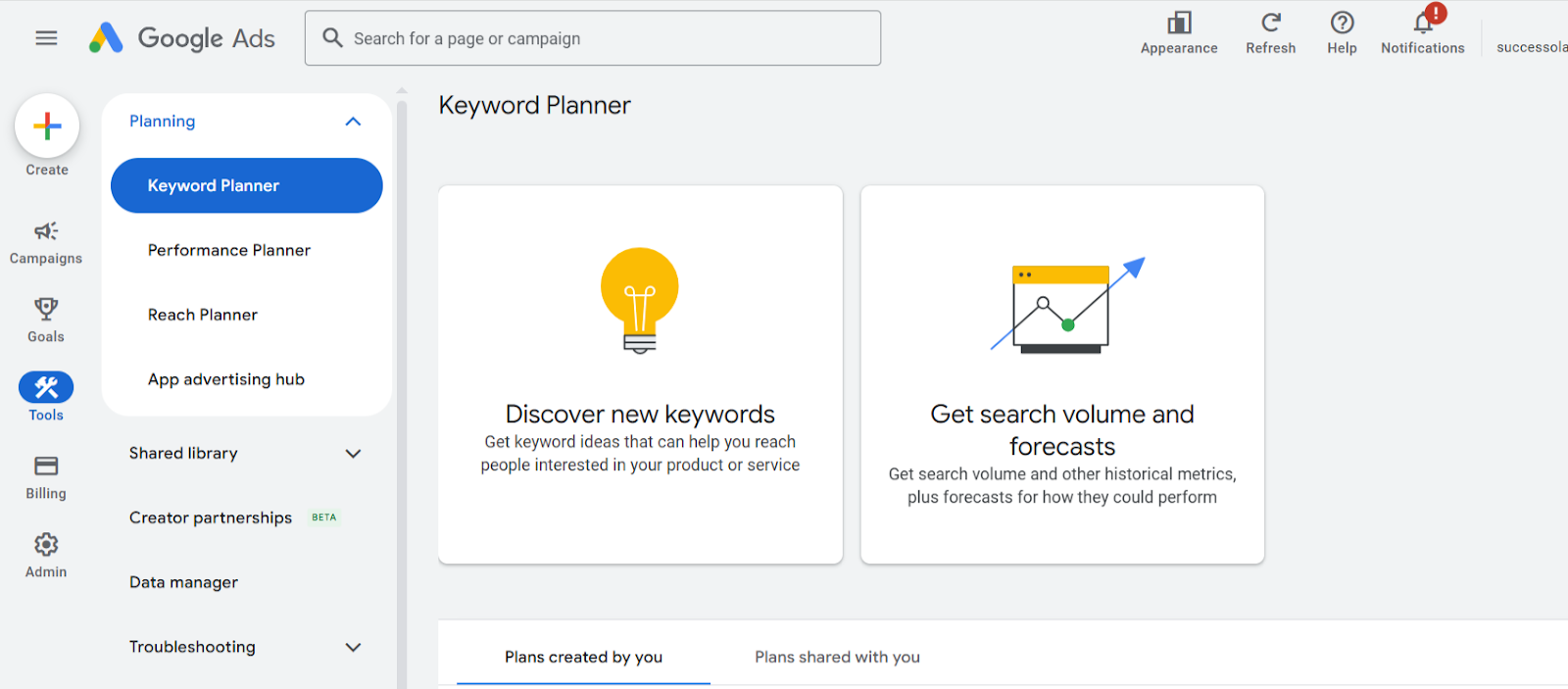
If you click the “Discover new keywords” section, you can research new keywords by entering your seed keywords or entering a website or page to find search queries matching the site.
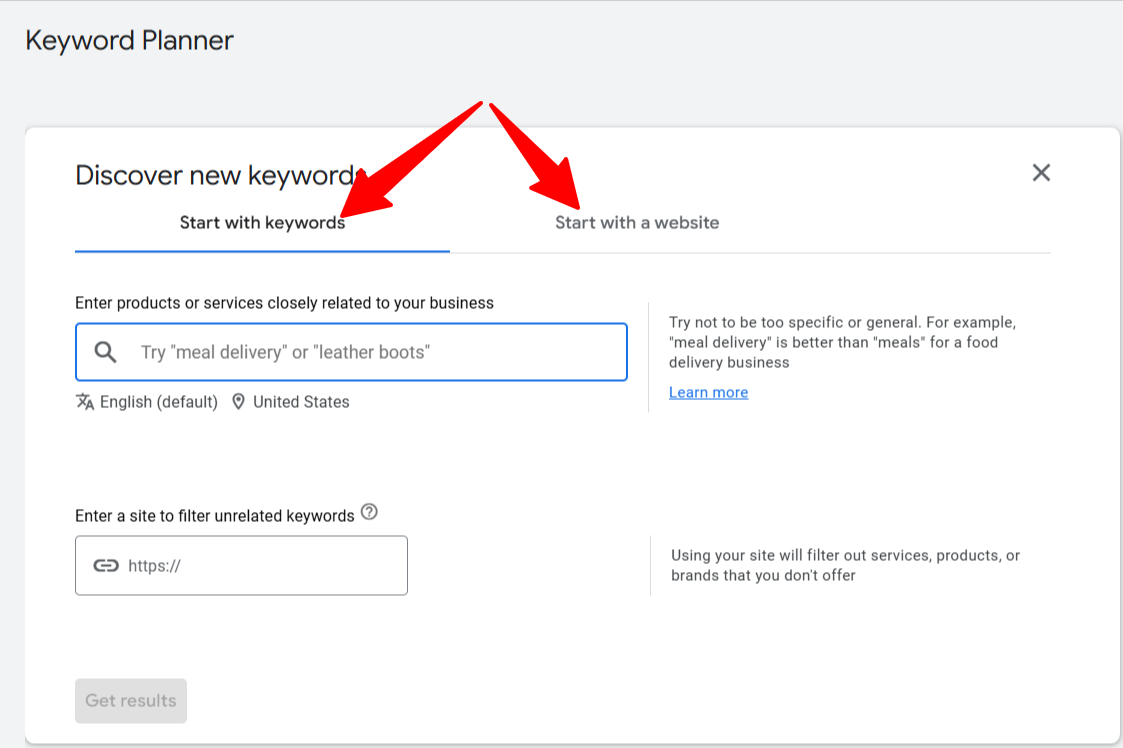
Note: Ensure to set your preferred language and target location.
The “Start with keywords” option allows you to enter multiple keywords. Preferably, you can enter your product features or services as your seed keywords to begin your keyword research.
Next, Keyword Planner shows your provided keywords data and suggests other relevant keyword ideas with their data.
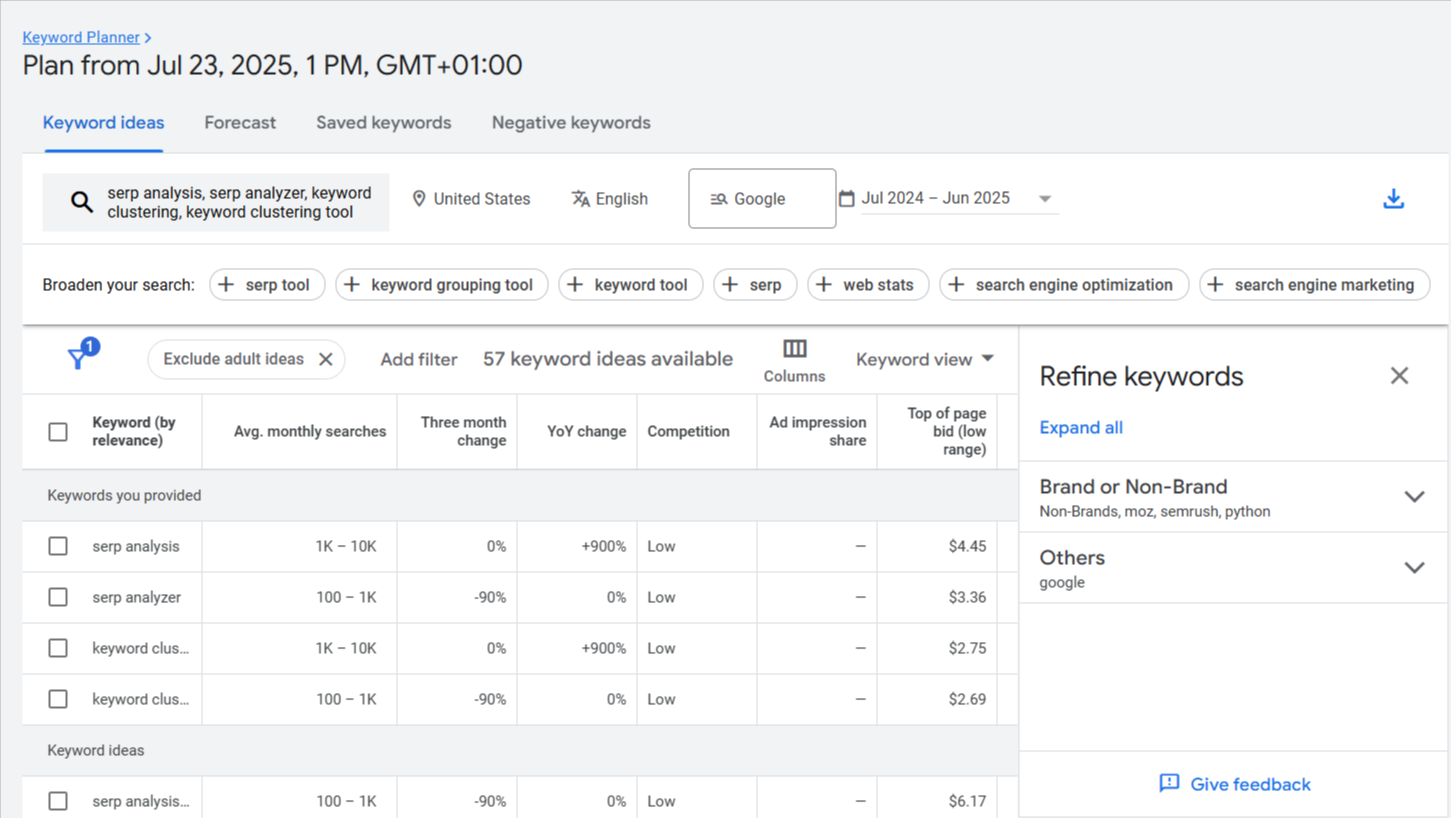
In the dashboard, you’ll see each keyword’s average monthly search (search volume), three-month change, Year-over-Year change, keyword competition, CPC, and more.
Interestingly, you can also see your keywords forecast in one click.
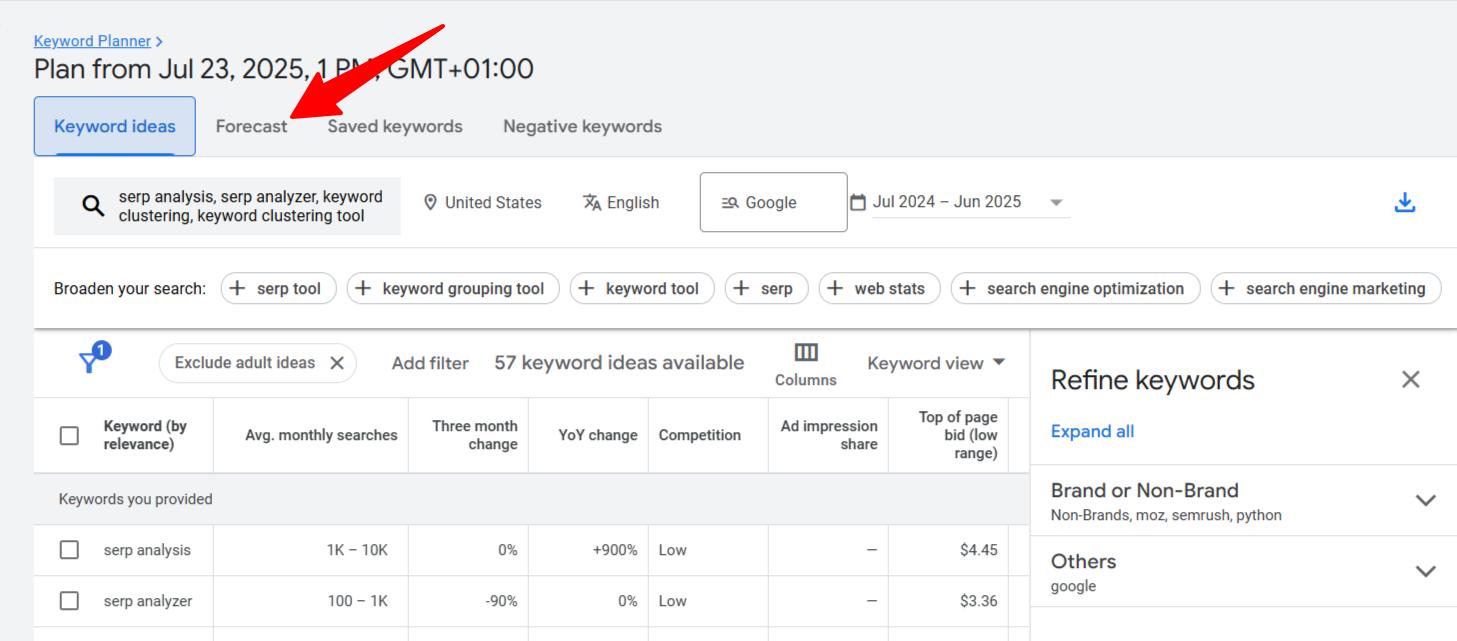
Alternatively, you can use the “Start with a website” option. Enter your website URL or top competitor URL as the source of keywords and click “Get results.”
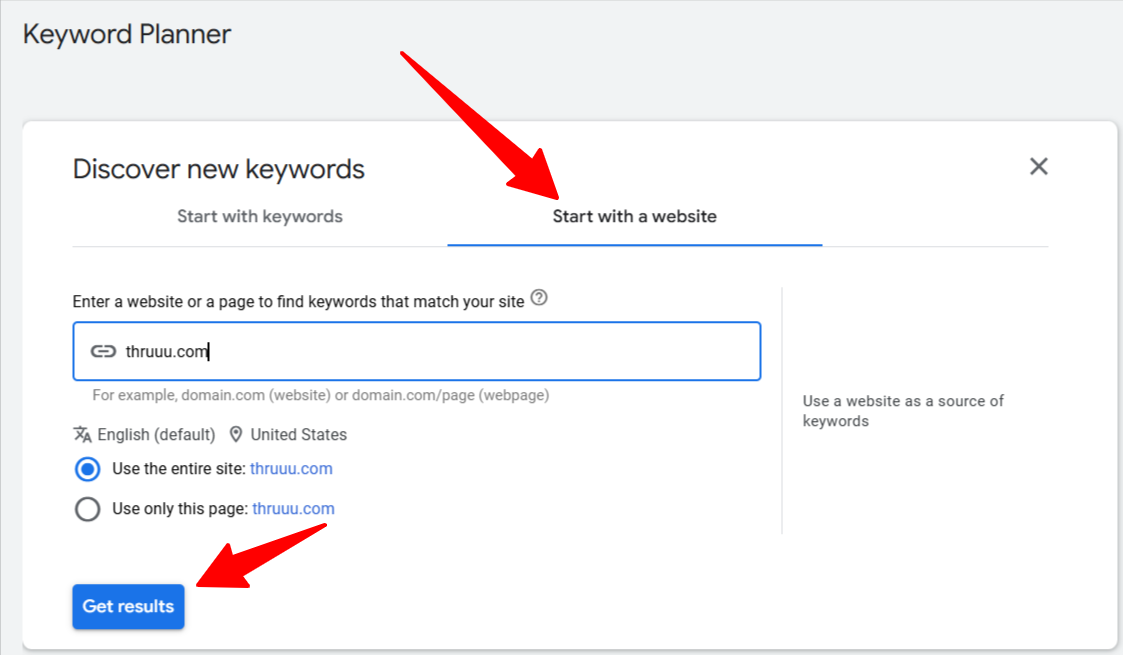
And then you have all the keywords in the provided website and their data, including search volume, competition, and more.
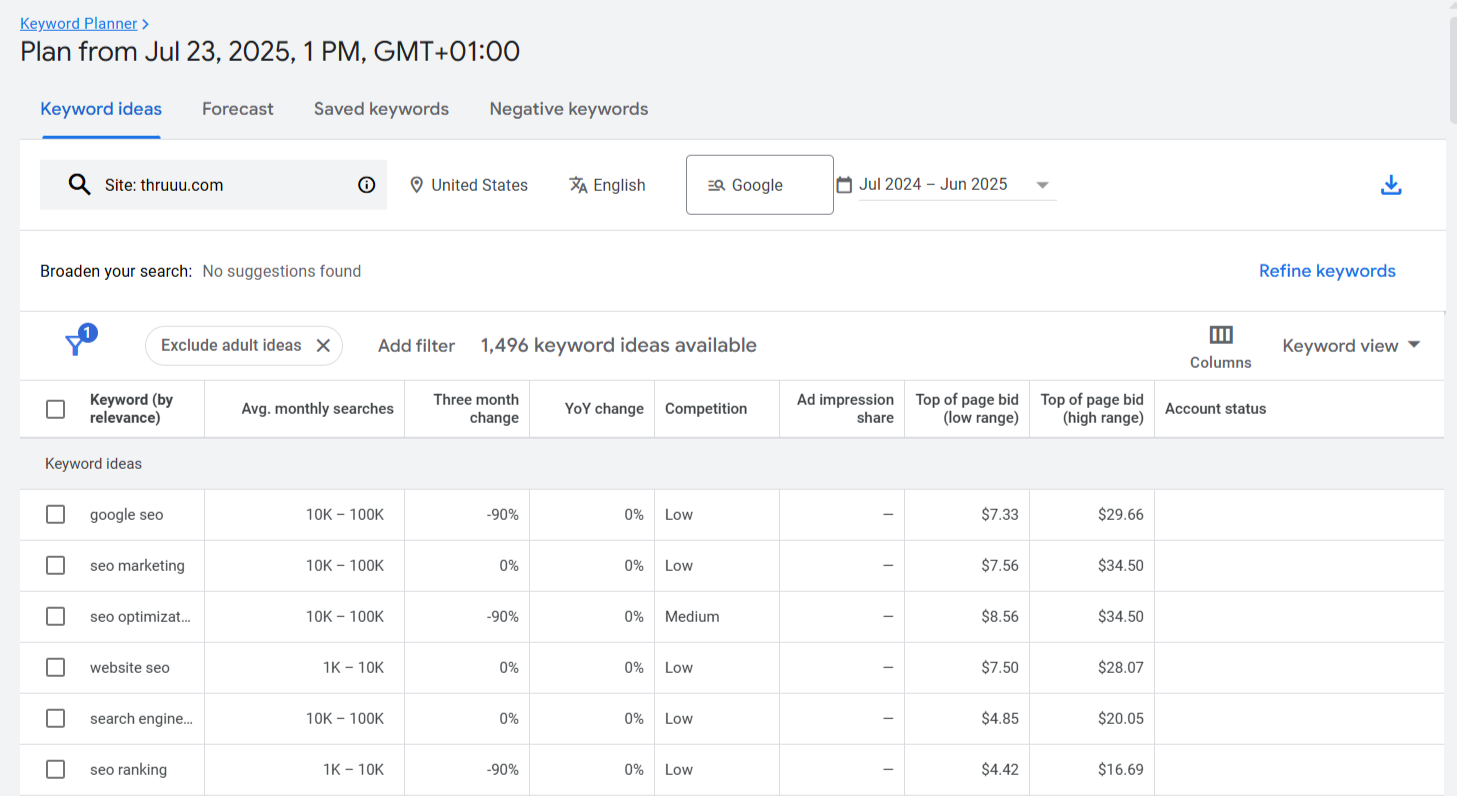
You can click on the export icon at the top right corner and download the keyword data as CSV or Google Sheets.
Key Features
- Accurate Search Volume Data – Get keyword volume estimates directly from Google.
- Keyword Suggestions – Discover new keyword ideas based on seed terms or URLs.
- Competition Level – See how competitive a keyword is for paid search.
- Location Targeting – Filter keyword data by country, region, or city.
- Forecasting – Predict potential ad performance with impression and cost estimates.
- Integration with Google Ads – Build and launch ad campaigns from within the tool.
Community Feedback

Limitations
- Requires a Google Ads account
- No SERP analysis
- Limited organic insights
- Broad search volume ranges
Pricing
Free
Google Search Console
Google Search Console (GSC) shows search queries people use to find your site. Unlike most tools that estimate keyword performance, this gives you real data from your pages—clicks, impressions, positions, and CTRs.
Most importantly, it uncovers low-hanging keyword opportunities, i.e.,
- Keywords you rank on pages 3 downward,
- Search queries driving visitors to your site that you have yet to optimise for
Here’s how to use GSC as a keyword research tool:
Check the Queries Section
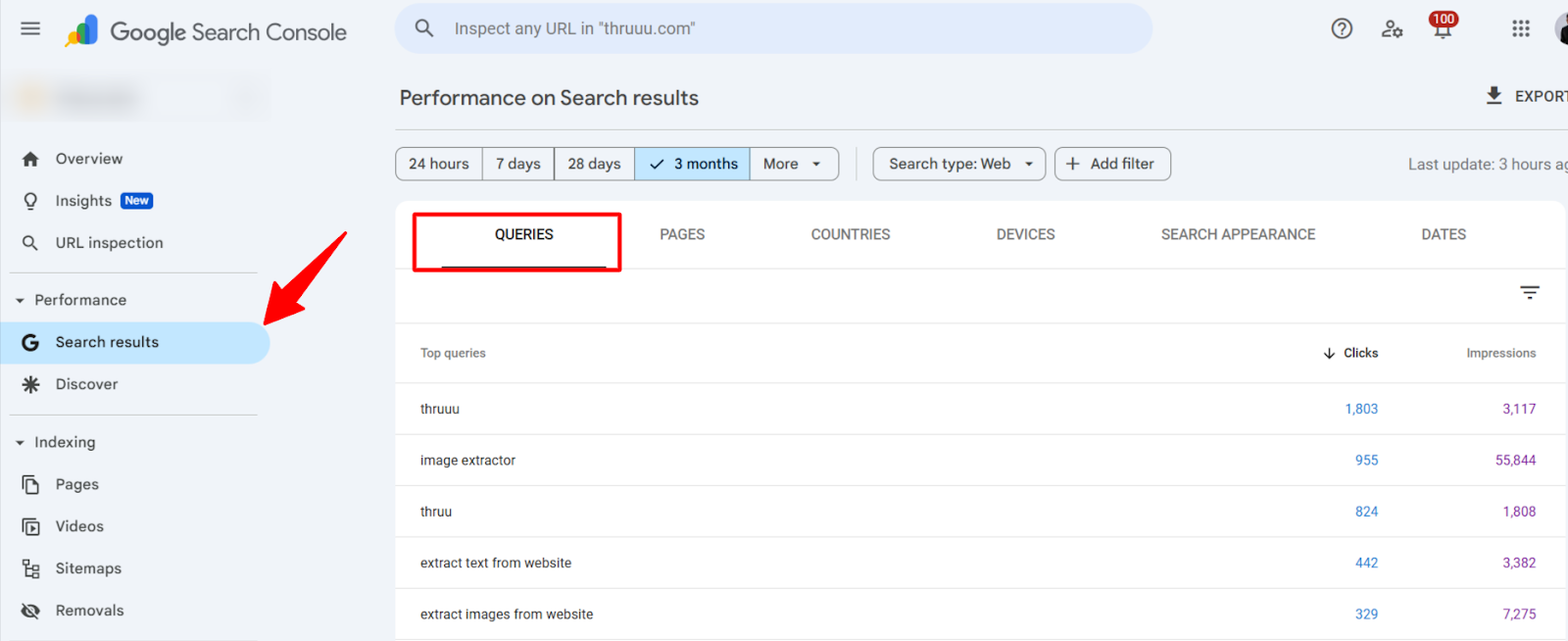
Go to your GSC account’s “Search results” tab and scroll down to the “Queries” section. Here, you’ll see all the search terms you rank for and are driving visitors to your website.
You’ll see search terms bringing visitors as you search through the queries, but you don’t have a page optimised for the keyword.
For example, we discovered some of our unoptimized keywords on Google Search Console, such as SERP tracking tools and keyword research tools. These search queries were opportunities to create fresh content that answered our visitors’ questions.
Use the Filter Option
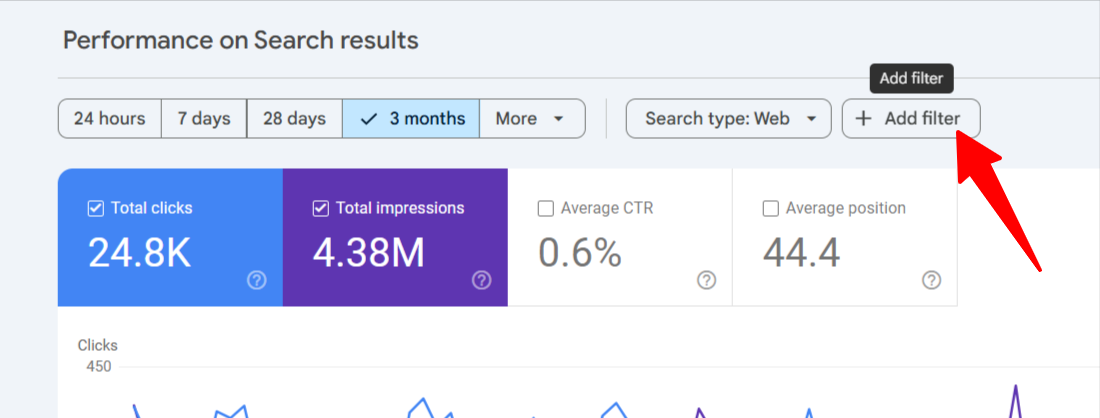
You can get low-hanging fruits or unoptimized keywords by searching with the “Add filter” icon. For example, if you filter by query, you’ll see “Queries containing,” “Queries not containing,” “Exact queries,” or “Custom (regex)” based on the provided search term.
You can analyse the list to find high-opportunity queries and new keywords based on real users’ searches.
Use Regex (Regular expression)
Regex in Google Search Console lets you filter and find specific queries or pages using patterns.
Examples of some regex include:
- ^how to – Finds queries that start with “how to”
- topic1|topic2|topic3 – Matches queries that contain any of these topics
- ^(?!.*free).* – Excludes queries containing “free”, useful if you’re targeting paid or premium keywords only.
- (?i)^(who|what|where|when|why|how) – see the questions (keyword) that your site is getting views and clicks for
To use them, click “Add filter > Query > Filter > Custom (Regex)”
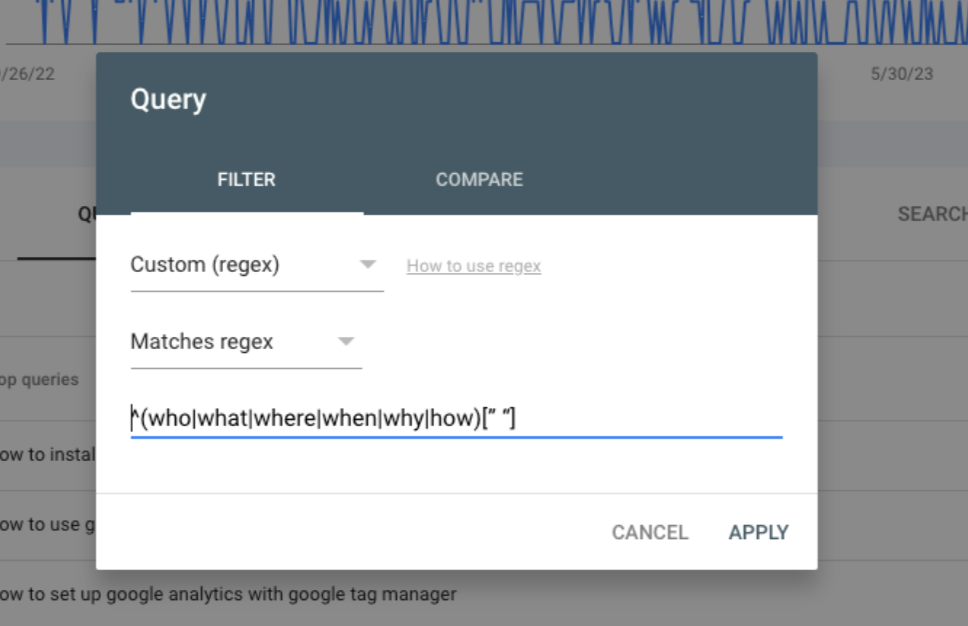
Then you have this filtered result.
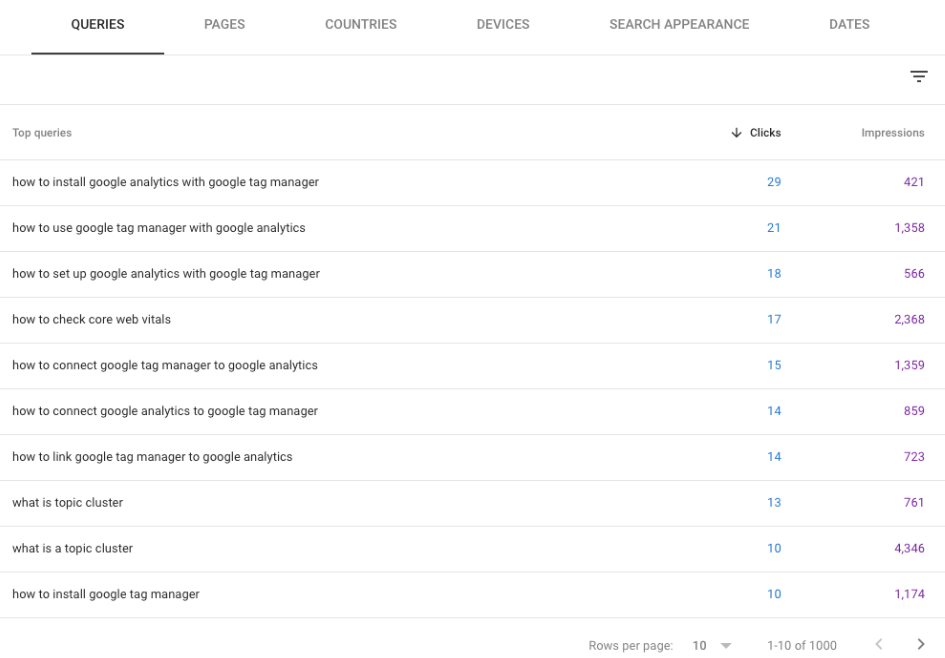
For an in-depth understanding, read our guide on tips for getting content ideas from Google Search Console.
Key Features
- Actual Search Queries – See the keywords people use to find your website.
- Click and Impression Data – Understand how often your site appears and gets clicked for each query.
- Average Position Tracking – Monitor where your pages rank for specific keywords.
- CTR Insights – Identify high-impression keywords with low click-through rates to improve content or titles.
- Regex Query Filtering – Using custom patterns, Group and analyse keyword variations more efficiently.
Limitations
- Requires manual review
- No keyword metrics
- Limited historical data range
Pricing
Free
thruuu SERP Analysis Tool
thruuu turns every keyword into a complete SERP teardown. It analyses the search results in real time, then shows relevant keyword data.
Most importantly, this tool gives you a clear picture of any keyword’s search intent and content structure. It’s also exceptionally valuable for creating pages that match what Google is rewarding.
Sign up for the thruuu SERP analysis tool, enter your seed keyword, location, and other filters.
The tool analyses the SERPs in seconds and comprehensively breaks down your keyword metrics.
The dashboard welcomes you with the first layer of information. Here you see the keyword search volume, CPC, competition, access to preview the SERP, and more.
You’ll also get on-page data of the top-ranking pages for your target keyword.

Next, you have an overview of the ranking pages on search results.
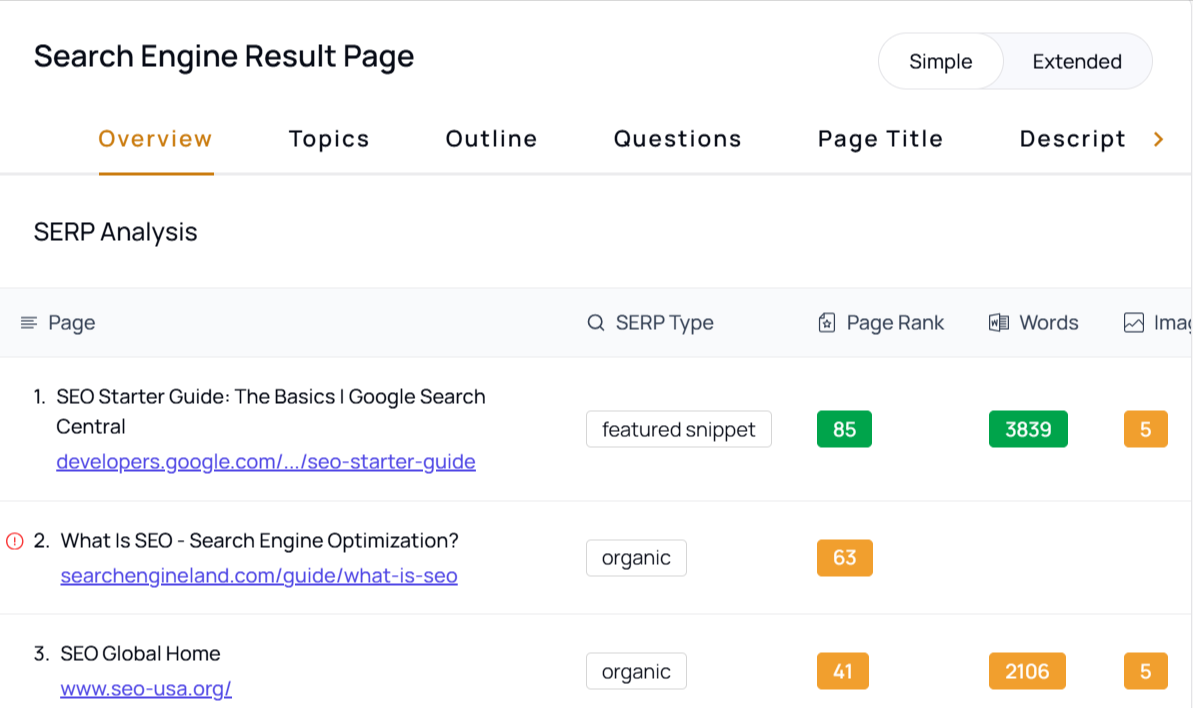
You can access further keyword data by clicking on other sections like “Questions.” This section shows you the questions from the People Also Ask box on SERPs, the most frequent questions from headings in ranking pages, questions from blog post comments, and the FAQ schema.
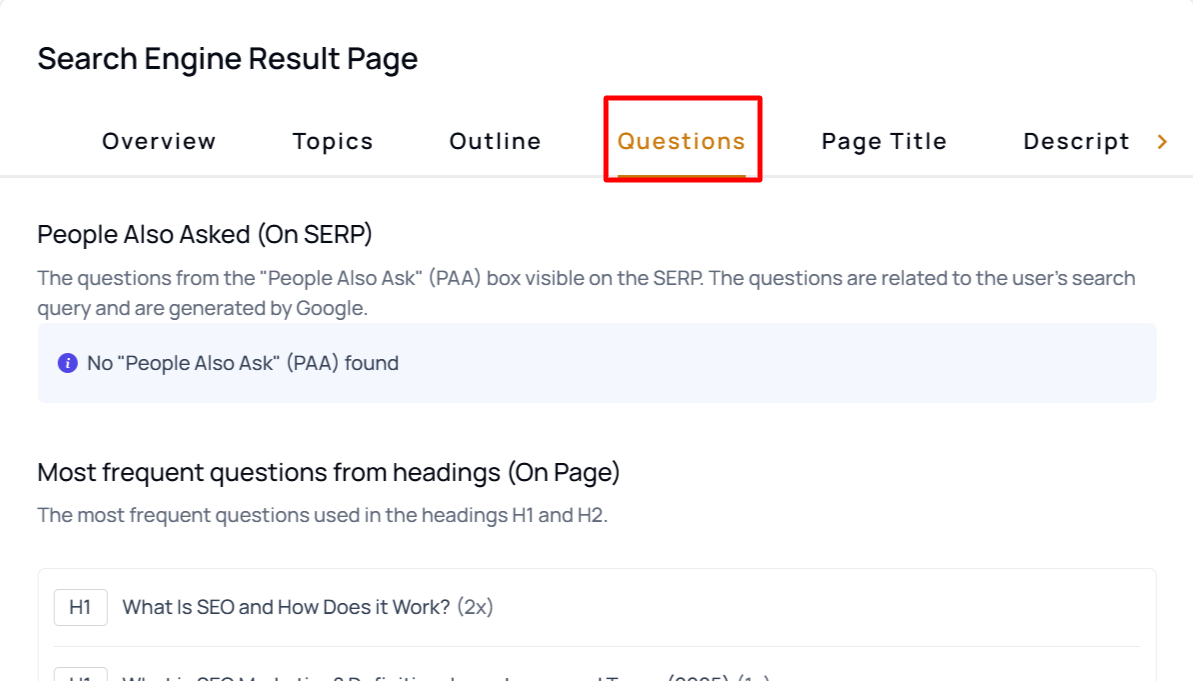
Again, if you hover to the right, you’ll see your keyword’s related searches.
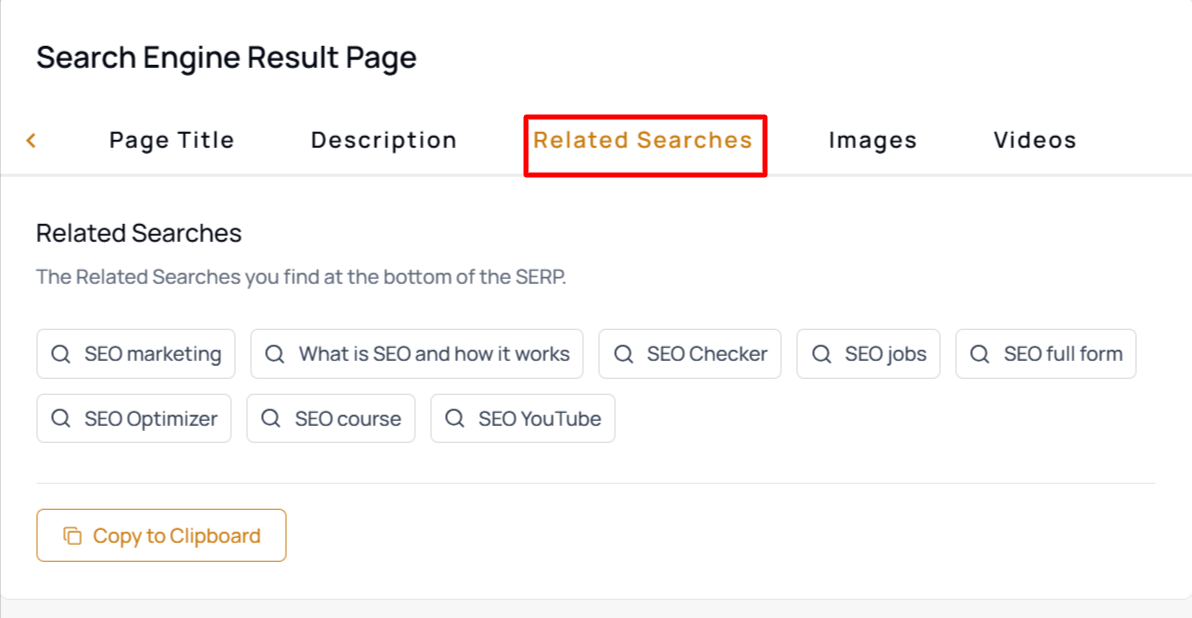
Interestingly, this tool provides other on-page SERP data like title, meta descriptions, headers, word counts, and image counts. So you can know what is working on the SERP and discover idea gaps that stand out.
thruuu SERP analysis tool also features an AI tool that provides fresh ideas to improve your content strategy.
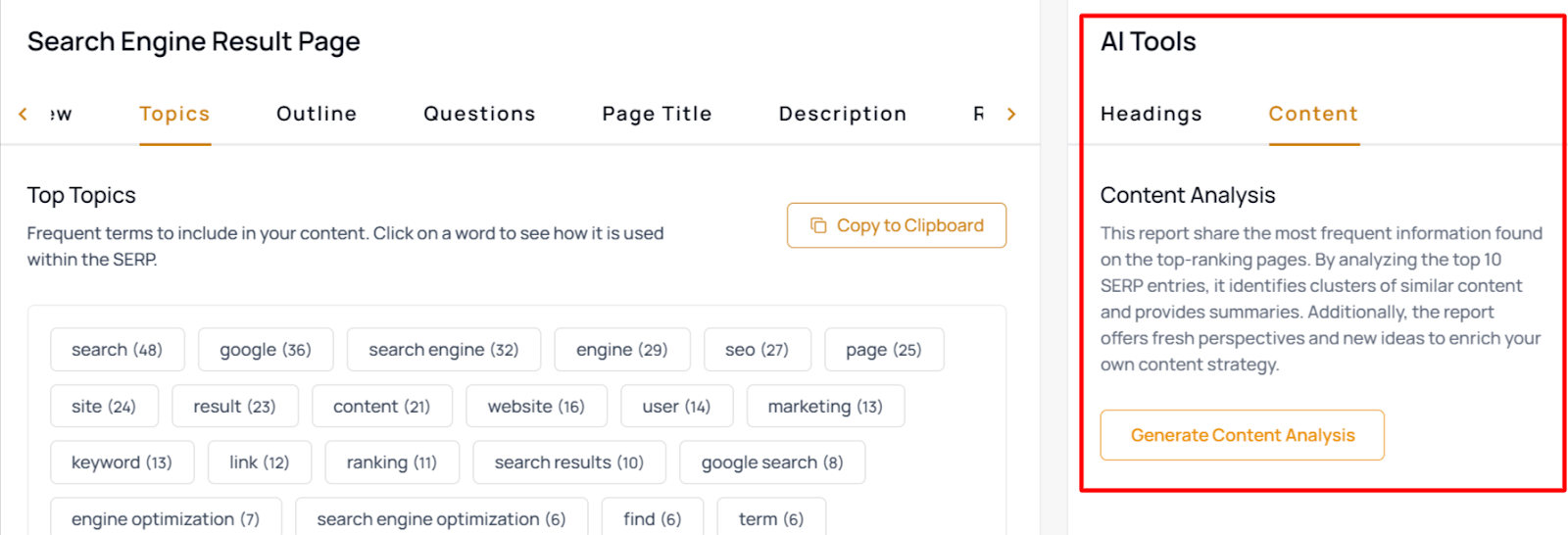
Note: You can download your research by clicking the “Download report” icon at the top of the dashboard.
Key Features
- Real-Time SERP Analysis – Analyses the top-ranking pages for any keyword.
- Content Structure Breakdown – Displays titles, meta descriptions, headers, and word counts for each result.
- Search Intent Identification – Helps determine what type of content (blog, product, guide) Google favours.
- Related Questions & Searches – Pulls People Also Ask, related searches, and autocomplete suggestions.
- Data Export – Allows easy export of all SERP data to CSV for further analysis or reporting.
Pricing
- Free – Analyse up to 10 keywords
- Starter – $13 (Analyse up to 75 keywords)
- Pro – $33 (Analyse up to 250 keywords)
- Agency – $66 (Analyse up to 700 keywords)
Ahrefs Keyword Explorer
Ahrefs Keyword Explorer helps you find high-volume terms and keyword opportunities where you can realistically rank, based on your site’s authority and the strength of competing pages.
Firstly, the tool has an intuitive interface, which makes it easy to use.
Enter your keyword(s) manually in the search bar or upload your keyword list as a CSV or TXT file. Ahrefs Keyword Explorer has an integrated AI tool that can suggest seed keywords based on your topic.
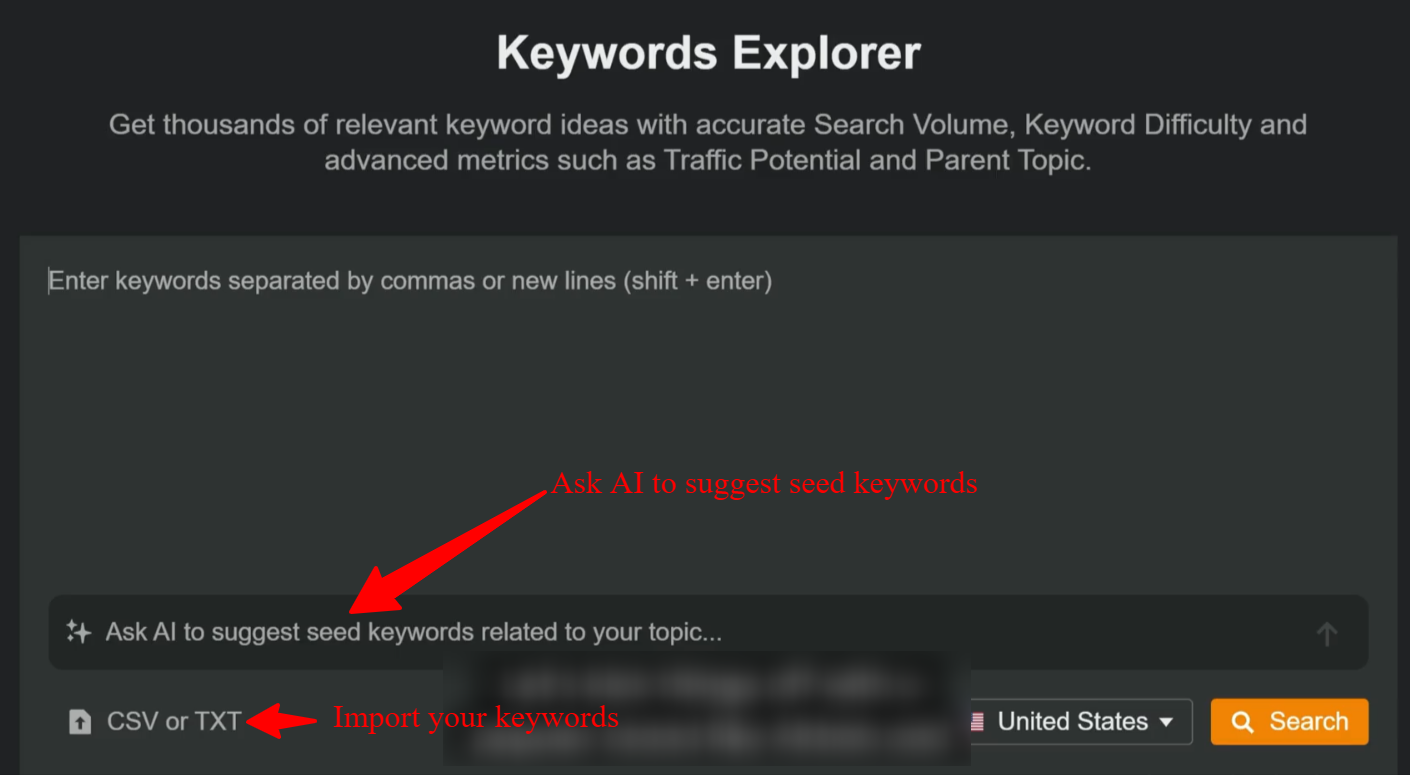
Next, the dashboard provides your keyword metrics, including the keyword difficulty, search volume in different countries, traffic potential, suggested keywords, and more.
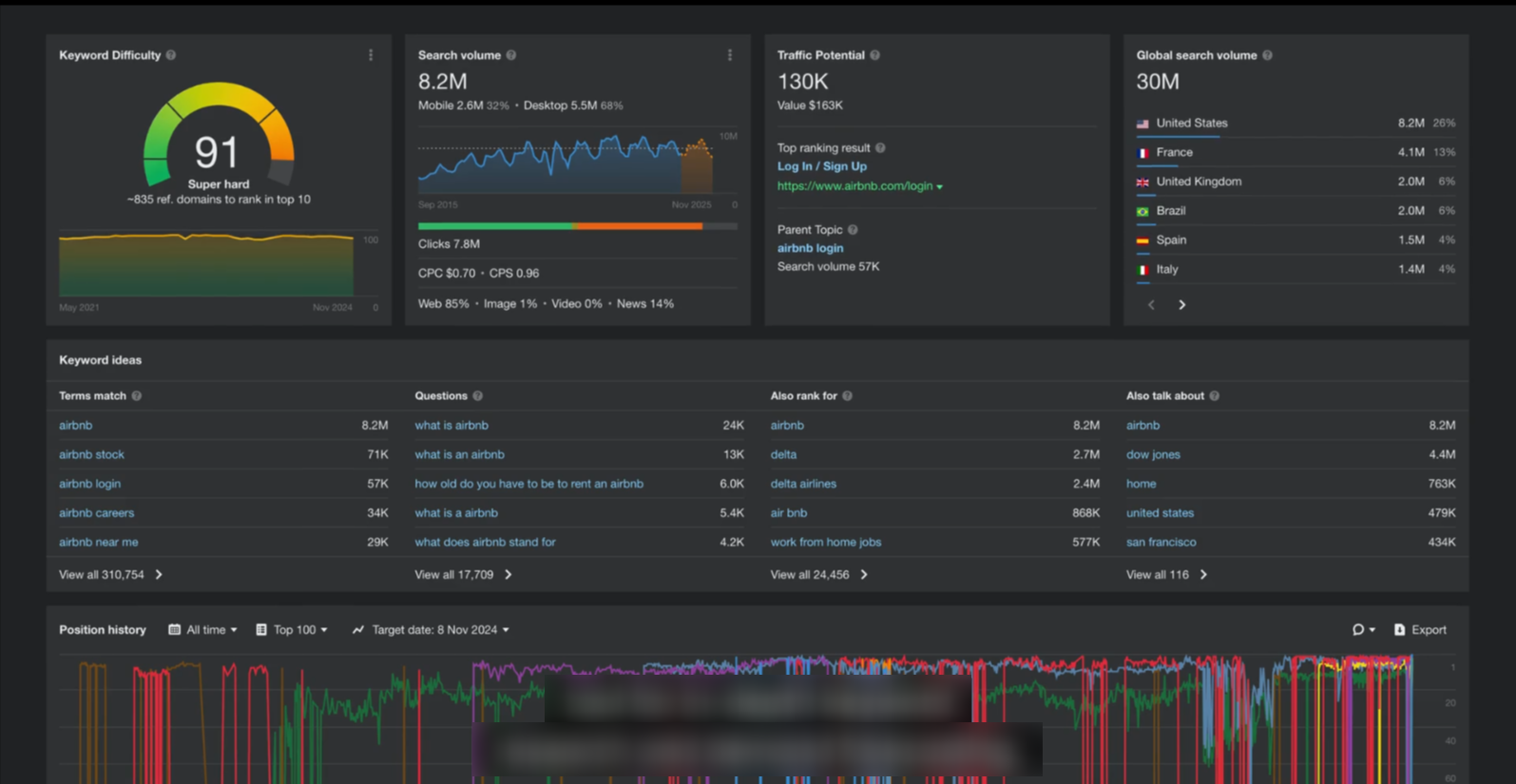
The tool also features easy-to-use filters that allow you to narrow your research to a preferred group of keywords.
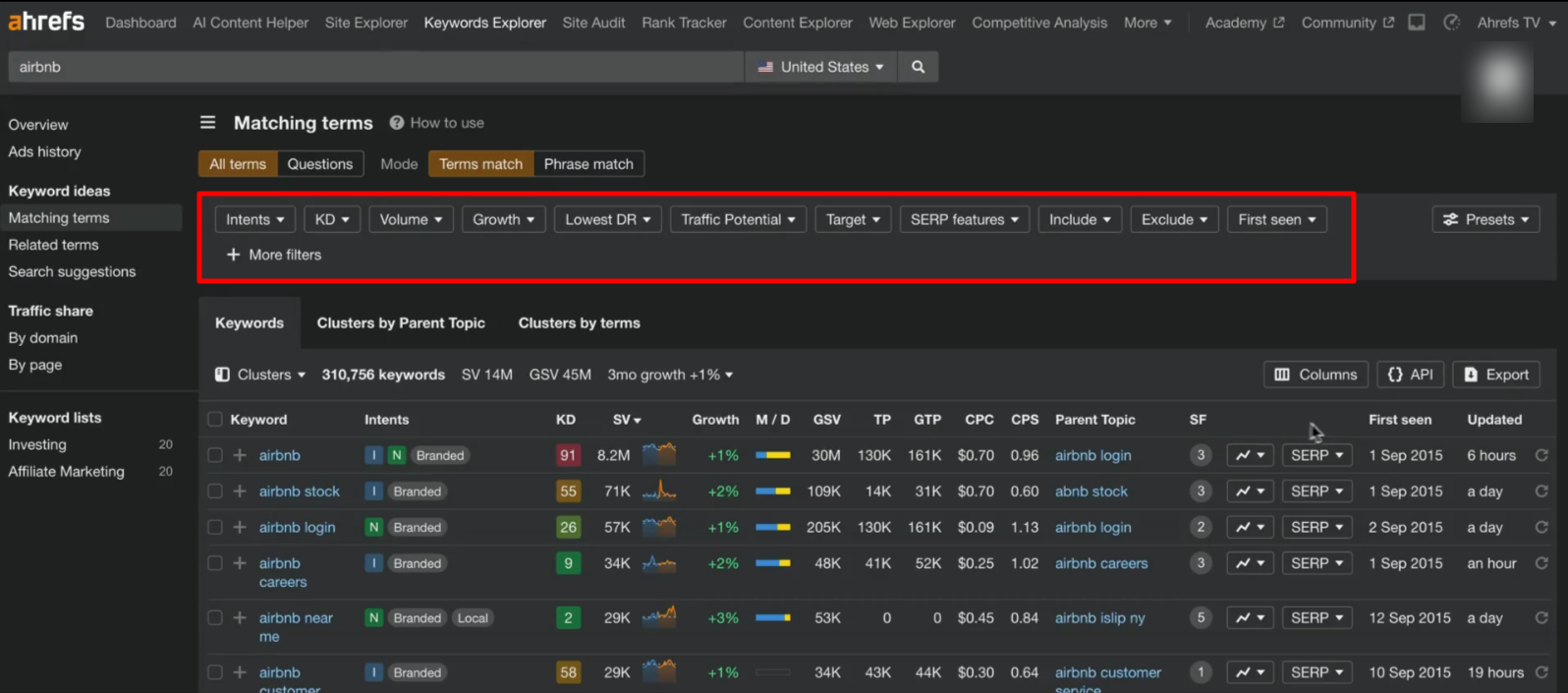
It also provides your keyword SERP overview with the percentage of traffic the top-ranking pages get.
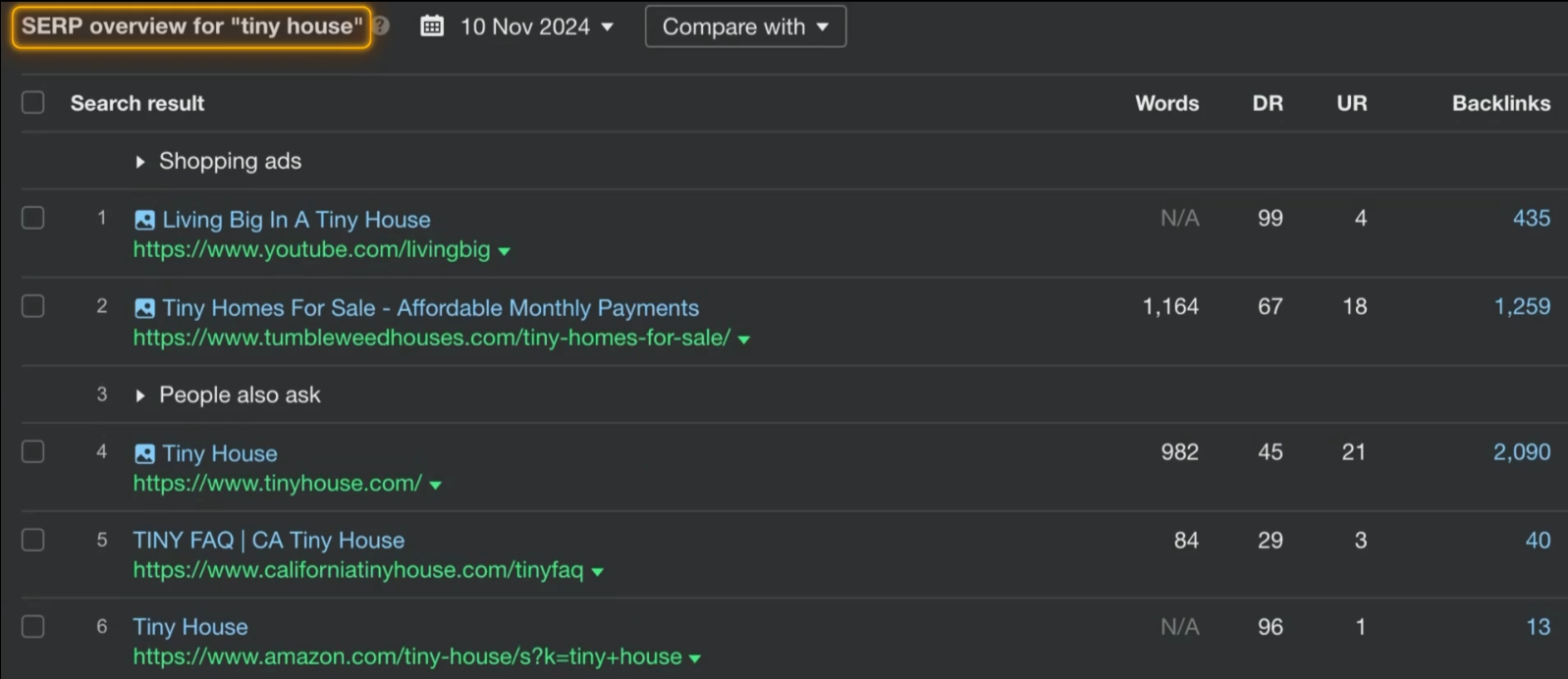
This tool also allows you to compare two keywords by metrics and SERP analysis. Here, you can discover SERP similarity and overlap.
Lastly, you can export the research by clicking the export icon at the top right corner of the dashboard.
Key Features
- Keyword Difficulty Score – Estimates how hard it is to rank based on backlink profiles of top results.
- Click Metrics – Shows total clicks, clicks per search, and percentage of paid vs. organic clicks.
- Search Volume Across Multiple Platforms – Offers keyword data from Google, YouTube, Amazon, Bing, and more.
- Parent Topic Grouping – Clusters related keywords under broader topics to help with content planning.
- SERP Overview with SEO Metrics – Displays top-ranking pages with backlink data, domain ratings, and traffic.
- Advanced Keyword Filters – Allows filtering by clicks, difficulty, volume, word count, and more for deeper research.
Community Feedback

Limitations
- No free access
- The learning curve may be overwhelming
Pricing
- Starter – $29/month
- Lite – $129/month
- Standard – $249/month
- Advance – $449/month
- Enterprise – $1,499/month
Semrush Keyword Research Tools
Semrush Keyword Overview combines search volume, keyword difficulty, CPC, competitive density, SERP features, global trend, keyword variations, and more into a single dashboard.
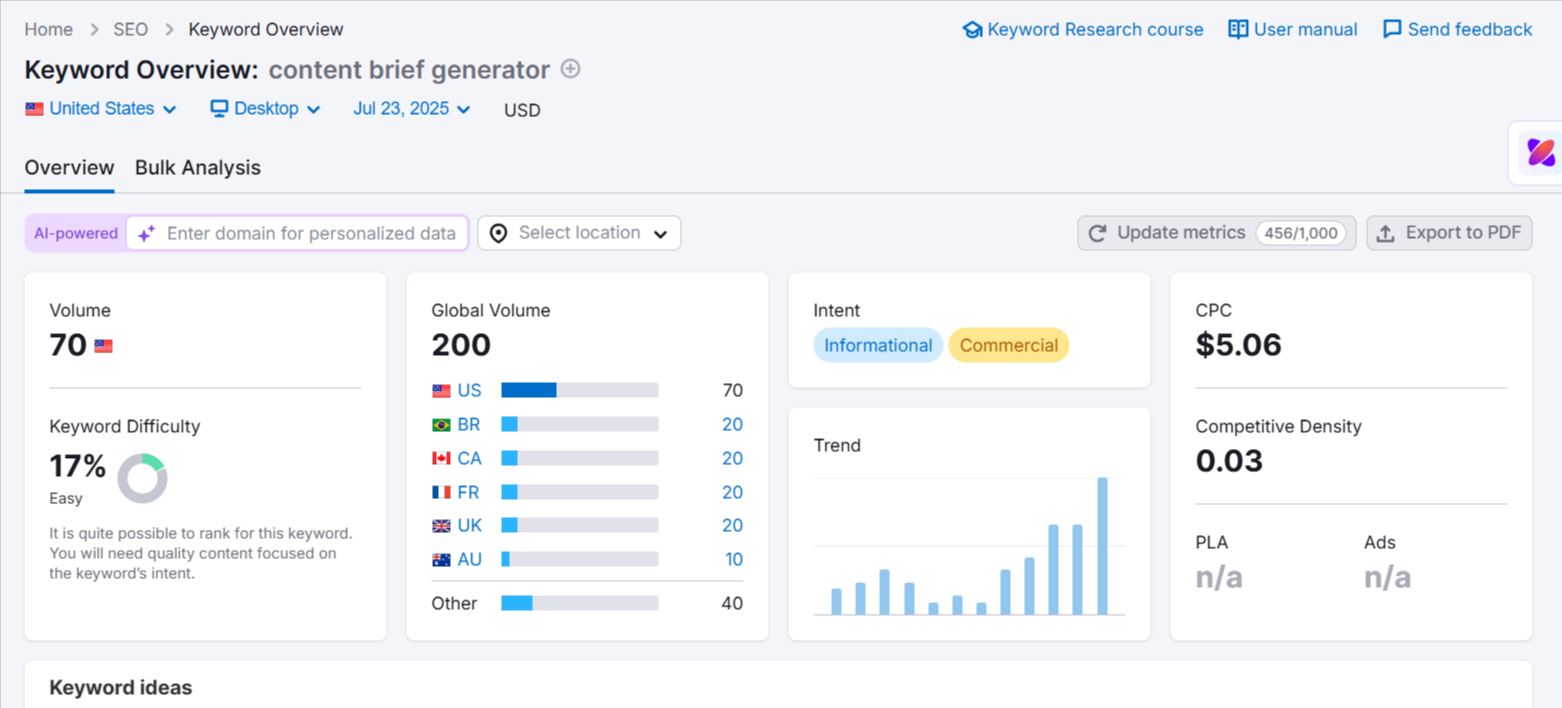
What sets it apart is how it visualises this data, making it easy to spot keyword intent, seasonality, and competition at a glance.
It also shows the actual SERP and traffic metrics for each ranking page, helping you quickly assess whether a keyword is worth targeting and what kind of content you’ll need to compete.
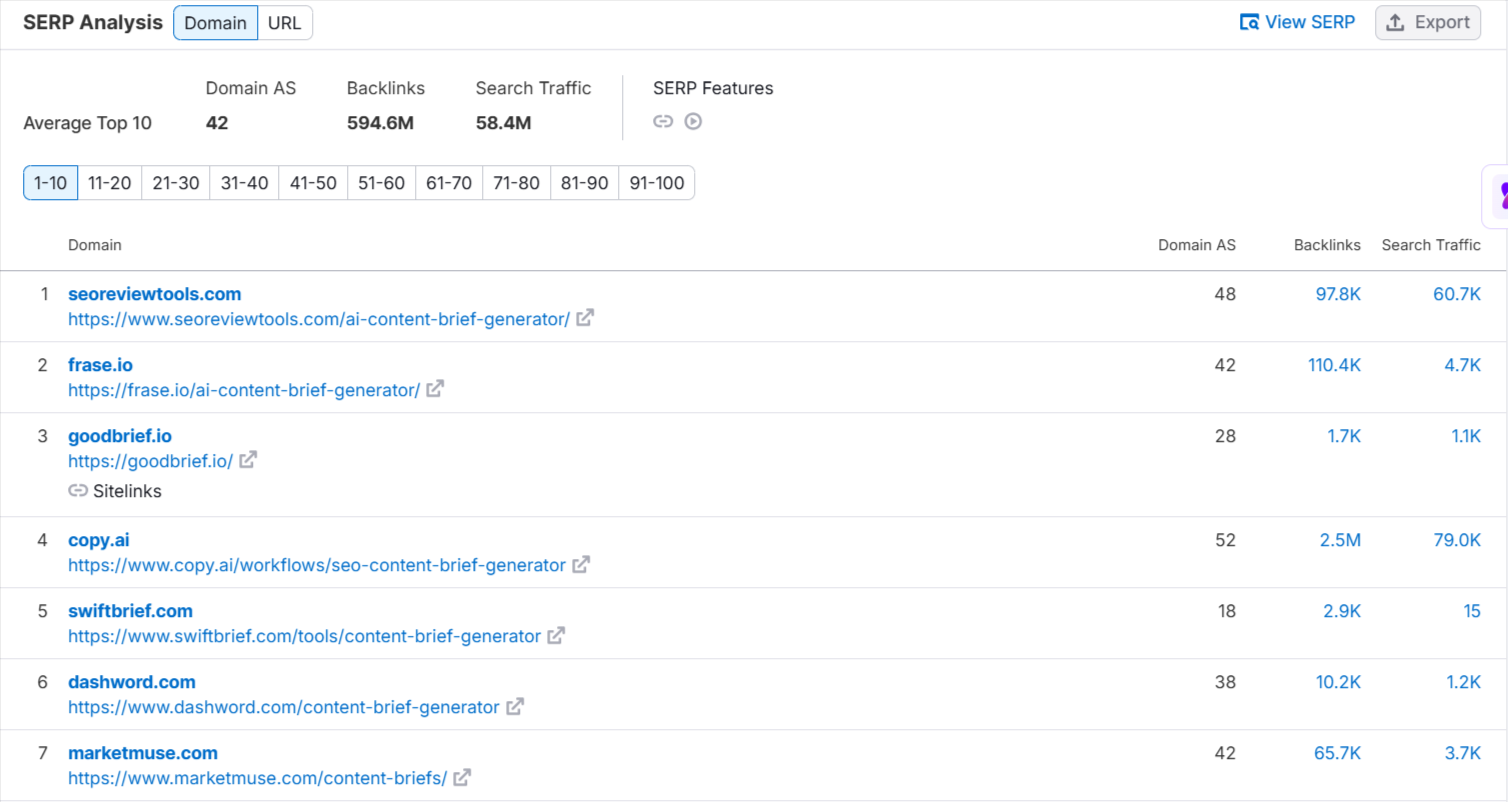
Semrush Keyword Magic Tool takes the research process a step further. It allows you to streamline the keyword list with different filters. You can include or exclude keywords, use the advanced filters, and more.
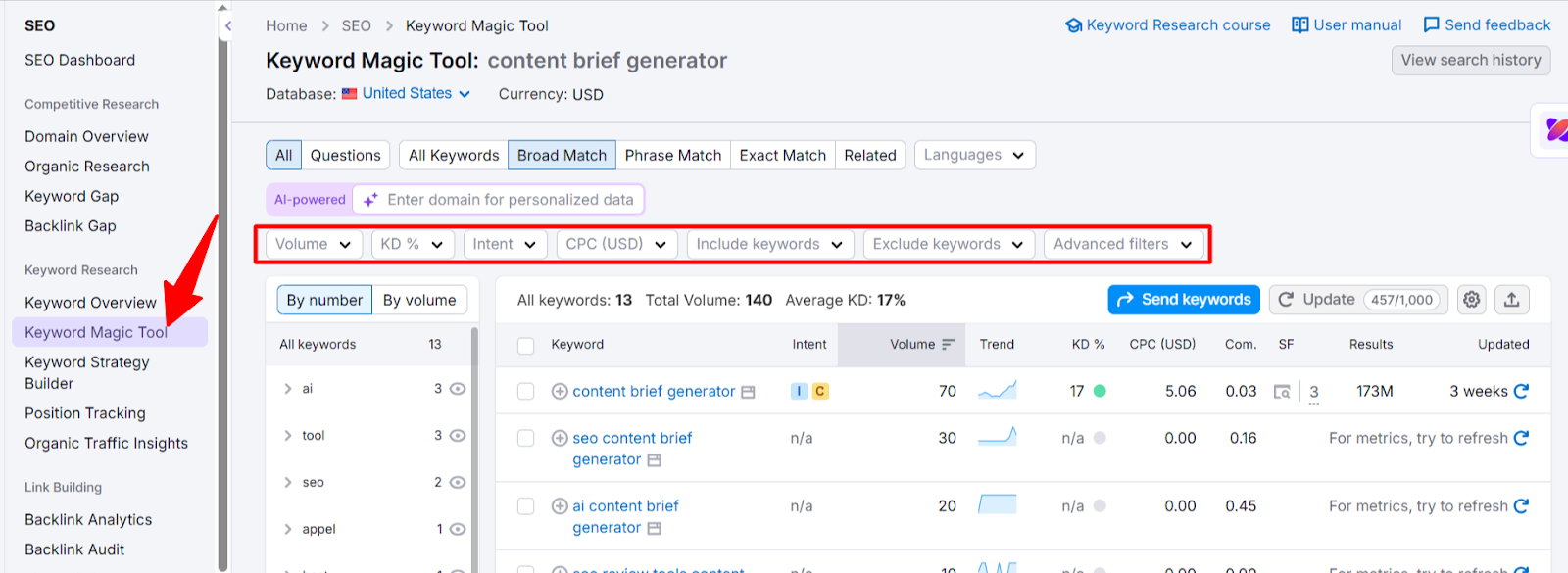
Click the export icon at the top right side of the dashboard to download the report.
Key Features
- Keyword Overview Dashboard – Provides a complete snapshot of search volume, keyword difficulty, CPC, and SERP features.
- Keyword Magic Tool – Generates thousands of keyword variations grouped by topic or question.
- Keyword Intent Classification – Labels keywords as informational, navigational, transactional, or commercial.
- SERP Analysis with Traffic Data – Shows the top-ranking pages with estimated traffic and backlink data.
- Keyword Trend Graphs – Displays historical and seasonal trends for search volume over time.
- Advanced Filtering Options – Allows filtering by volume, difficulty, word count, intent, SERP features, and more.
Community Feedback

Limitations
- High cost for full access
- The interface can be overwhelming
- No on-page SERP data
Pricing
- Free trial
- Pro – $139.95/month
- Guru – $249.95/month
- Business – $499.95/month
Answerthepublic
AnswerThePublic turns a single keyword into a visual map of real user questions, comparisons, and related phrases alongside the search volume and difficulty. This feature makes it helpful for uncovering long-tail keywords, content ideas, and search intent.
The tool also allows keyword research on multiple search engines like Google and Bing and social media platforms like YouTube, Instagram, and TikTok.

Its result features different sections and display formats. It comprises all the questions around the keyword, People Also Ask questions on SERP, comparisons, alphabetical order of questions, and more.
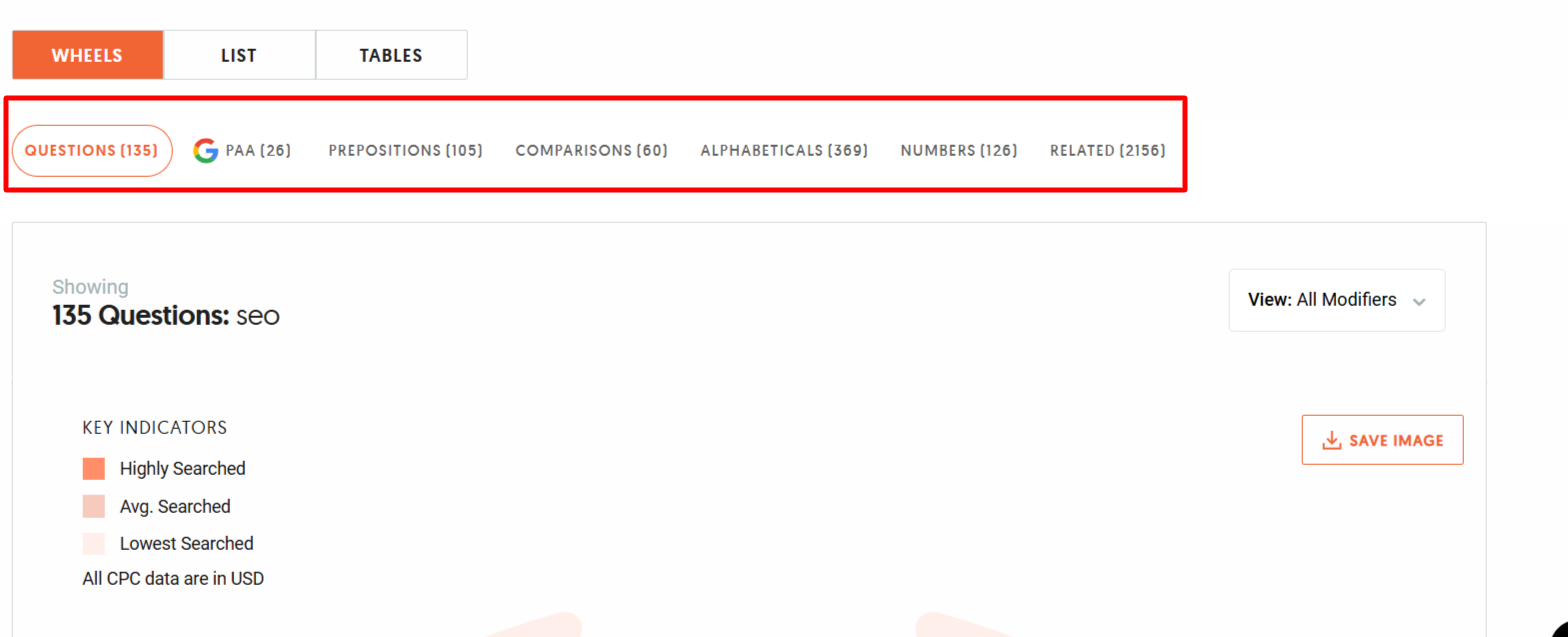
You can see all the results as wheels, lists, or tables. Again, you can share the research through a link or download it as a CSV for further analysis.
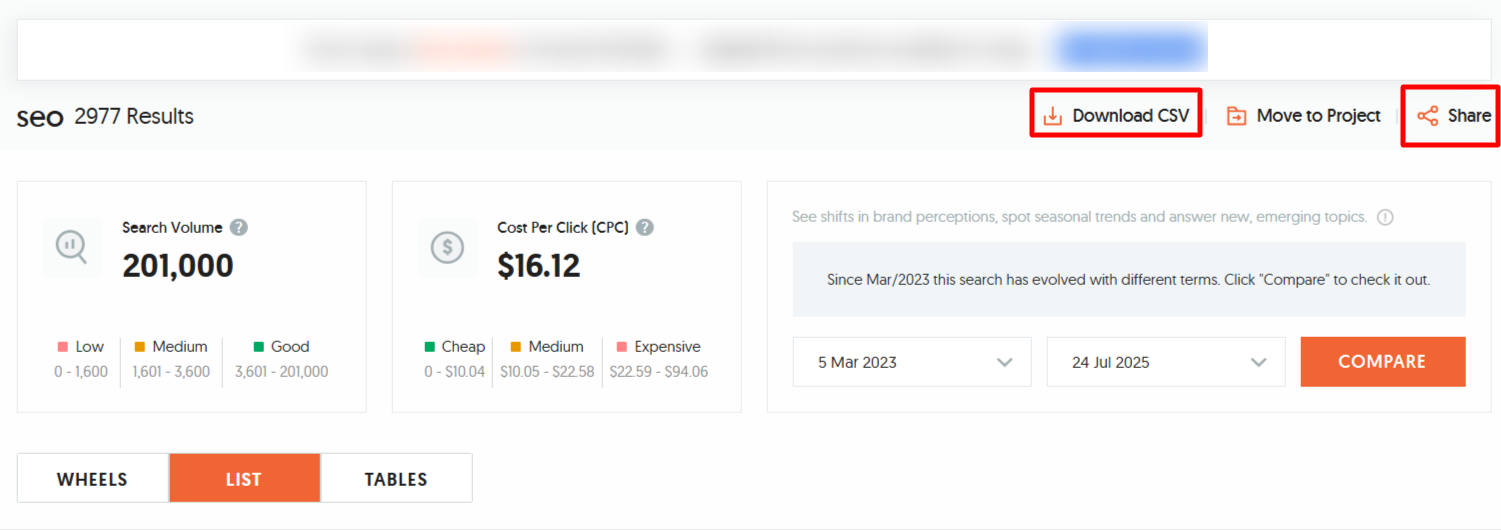
Key Features
- Visual Keyword Mapping – Presents questions, comparisons, and related phrases in an easy-to-read visual format.
- Long-Tail Keyword Discovery – Uncovers detailed, conversational queries that reflect real user intent.
- Grouped Keyword Categories – Organises keywords by question type (who, what, when, why, etc.), prepositions, and comparisons.
- Search Listening Over Time – Tracks how search behaviour around a topic changes over weeks or months (Pro feature).
- Exportable Reports – You can download all keyword data in different formats for deeper analysis.
Community Feedback

Limitations
- Limited daily searches for the free plan
- No SERP or competitive analysis
- Answers are sometimes repetitive
Pricing
- Free plan – 3 daily searches for
- Individual – $5/5/month (100 searches daily)
- Pro – $49/month (Up to 3 users & unlimited searches daily)
- Expert – $99/month (Unlimited users and searches daily)
Moz Keyword Explorer
Moz Keyword Explorer is easy to use and has a simple dashboard that makes keyword research stressless.
The dashboard provides an overview of the keyword, including the monthly search volume, difficulty, minimum DA of ranking pages, organic CTR, SERP features available, and more.
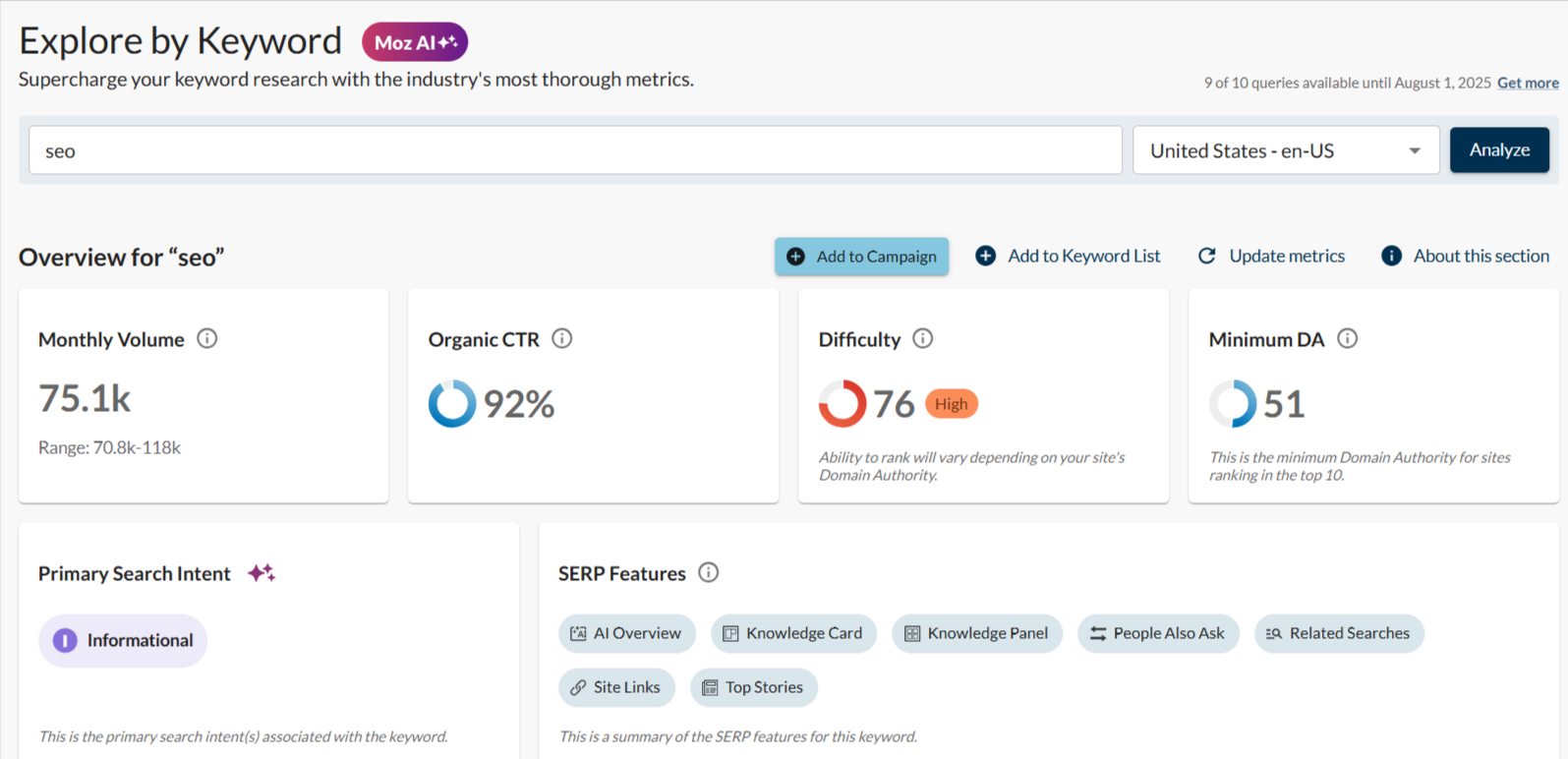
Moz Keyword Explorer also provides keyword suggestions and the keyword’s SERP analysis.
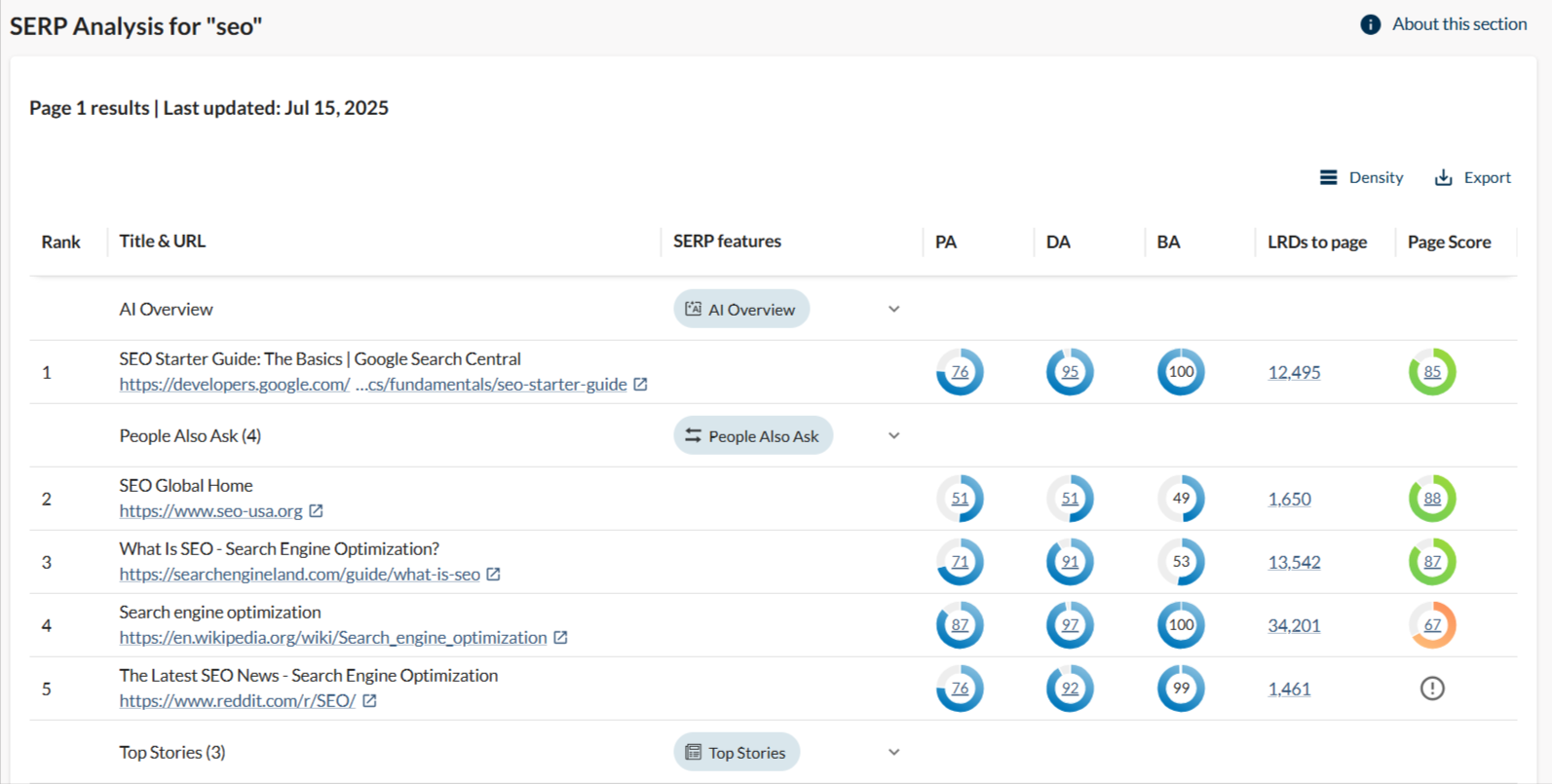
The SERP analysis features the ranking page’s Page Authority, Domain Authority, Backlink Authority, Linking Root Domains to Page, and Page Score.
You can download the research as a CSV or Excel file.
Key Features
- Keyword Difficulty Score – Measures how hard it is to rank on the first page based on the strength of current top-ranking pages.
- Organic CTR Estimate – Predicts how likely users are to click organic results for a given keyword.
- SERP Analysis with Link Metrics – Shows top-ranking pages with key SEO metrics like PA, DA, LRDs, and Spam Score.
- Keyword Suggestions & Grouping – Generates and clusters keyword ideas based on topics and lexical similarity.
- Saved Keyword Lists – You can organise, track, and compare keywords across projects.
Community Feedback
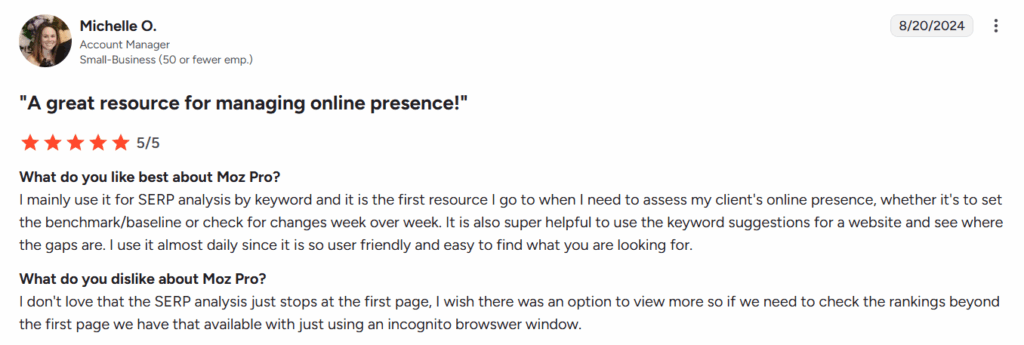
Limitations
- SERP analysis stops at the first page
- Fewer data for the non-English market
- Limited daily searches for the free plan
Pricing
- Free trial
- Starter – $49/month
- Standard – $99/month
- Medium – $179/month
- Large – $299/month
Frequently Asked Questions on SERP Keyword Research
What is a SERP keyword research tool?
A SERP keyword research tool helps you discover and analyse keywords based on actual search engine results pages (SERPs), showing you which keywords competitors rank for and identifying opportunities for your site.
Why are SERP-focused tools better than basic keyword tools?
SERP-focused tools give real-time, competitor-driven insights, showing actual ranking pages, featured snippets, and SERP features. This allows for more accurate keyword targeting than tools relying solely on search volume.
How often should I perform SERP keyword research?
Ideally, you should revisit your keyword research every few months, especially after algorithm updates or shifts in user behaviour, to stay competitive and adjust your SEO strategy accordingly.
Are free SERP keyword research tools effective?
Free tools can provide basic keyword suggestions, but paid SERP-focused tools like thruuu usually offer deeper insights like live SERP snapshots and competitor analysis, which are essential for a successful SEO campaign.
Empower Your Content Team
Our end-to-end content optimization solution empowers your team to crack the Google algorithm, craft exceptional content, and achieve remarkable organic search results.
